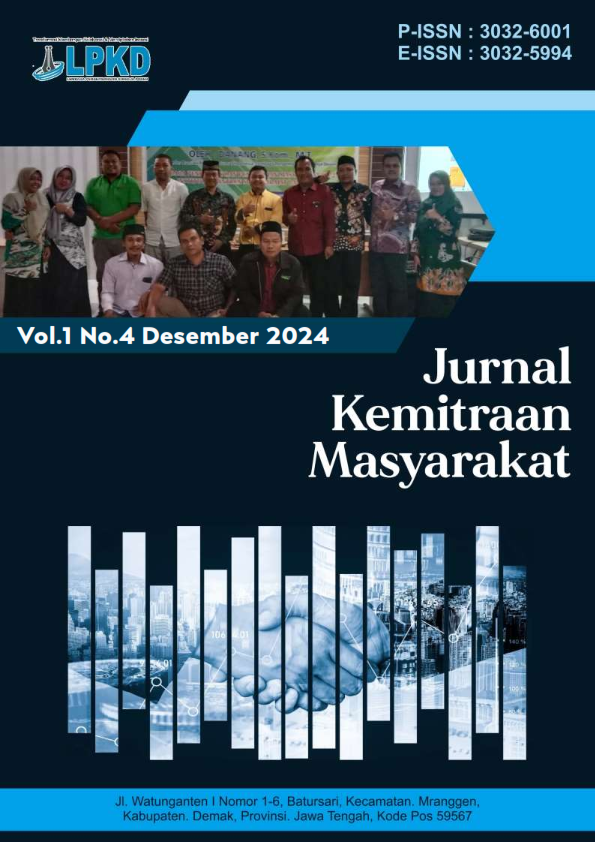Pendekatan Psikoedukasi dalam Mencegah Kecanduan Gadget pada Siswa Kelas 9 di SMPN 45 Semarang
DOI:
https://doi.org/10.62383/jkm.v1i4.898Keywords:
Psychoeducation, gadget addiction, teenagersAbstract
The development of technology makes daily activities easier. However, at the same time it can also have negative impacts, one of which is gadget addiction. Currently, many teenagers have grown up along with the development of gadgets since early age. This makes them accustomed to using gadgets in their daily lives. However, if used excessively, it can cause gadget addiction. From the sample of student assessment results from SMPN 45 Semarang, students were found to be indicated as being addicted to gadgets. Therefore, researchers took the initiative to conduct an intervention in the form of psychoeducation to educate teenagers about gadget addiction. Based on the results of the pretest and posttest analysis, an increase in knowledge related to gadget addiction was found with a significance value of 0.000 <0.05. These results indicate that intervention in the form of psychoeducation can successfully increase adolescent knowledge related to gadget addiction
References
Brown, N.W. (2011). Psychoeducational groups 3rd edition: Process and practice. New York: Routledge Taylor & Francis Group.
Cahyono, B. D., Aristawati, E., & Huda, N. (2023). Upaya Mengurangi Kecanduan Gadget bagi Anak dan Remaja melalui Psikoedukasi Keluarga di Wilayah Perkebunan. Jurnal Peduli Masyarakat, 5(4), 1105-1110.
Gunawan, R., Aulia, S., Supeno, H., Wijanarko, A., Uwiringiyimana, J. P., & Mahayana, D. (2021). Adiksi media sosial dan gadget bagi pengguna internet di indonesia. Techno-Socio Ekonomika, 14(1), 1-14.
Jamshed, S. (2014). Qualitative research method-interviewing and observation. Journal of basic and clinical pharmacy, 5(4), 87.
Kurniawati, D. (2020). Pengaruh penggunaan gadget terhadap prestasi siswa. Edukatif: Jurnal Ilmu Pendidikan, 2(1), 78-84.
Lukens, E. P., & McFarlane, W. R. (2004). Psychoeducation as evidence-based practice: Considerations for practice, research, and policy. Brief Treatment & Crisis Intervention, 4(3).
Mabaroh, B., & Sugianti, L. (2021). Gadget addiction and the students’ achievement. International Journal of Social Learning (IJSL), 1(3), 321-332.
Nuramadan, D. K., Muttaqin, Z., Fatah, V. F., & Desmaniarti, Z. (2023). Ketergantungan Handphone pada Remaja. Jurnal Keperawatan Indonesia Florence Nightingale, 3(1), 31-36.
Soep, B. S. & Sutatminingsih, R. (2009). Pengaruh Intervensi Psikoedukasi dalam Mengatasi Depresi Postpartum di Rsu Dr. Pirngadi Medan (Doctoral dissertation, Universitas Sumatera Utara).
Surat, S., Govindaraj, Y. D., Ramli, S., & Yusop, Y. M. (2021). An Educational Study on Gadget Addiction and Mental Health among Gen Z. Creative Education, 12(7), 1469-1484.
Syahudin, D. (2019). Pengaruh Gadget Terhadap Pola Interaksi Sosial dan Komunikasi Siswa. GUNAHUMAS Jurnal Kehumasan, 2(1), 273–282.
Walsh, J. (2009). Psychoeducation in mental health. Oxford University Press.
Widyawati, I., & Sugiman, H. E. (2014). Pengaruh Penggunaan Gadget terhadap Daya Kembang Anak. In Seminar Nasional Multidisiplin Ilmu, 10(6), p. 12.
Downloads
Published
How to Cite
Issue
Section
License
Copyright (c) 2024 Jurnal Kemitraan Masyarakat

This work is licensed under a Creative Commons Attribution-ShareAlike 4.0 International License.





